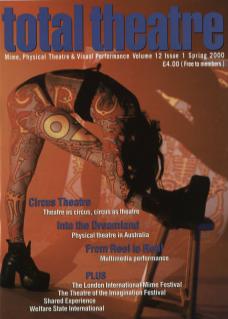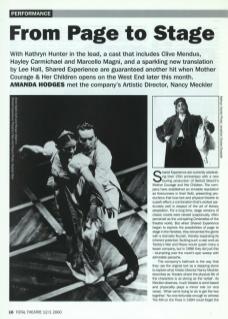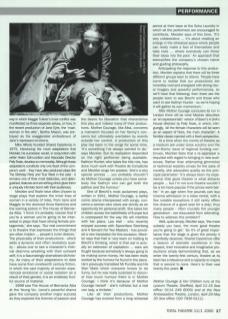Shared Experience are currently celebrating their 25th anniversary with a new touring production of Bertolt Brecht's Mother Courage and Her Children. The company have established an enviable reputation as forerunners in their field, presenting productions that fuse text and physical theatre to superb effect: a combination that's worked particularly well in respect of the art of literary adaptation. For a long time, stage versions of classic novels were viewed suspiciously, often perceived as the uninspiring Cinderellas of the theatre world. But when Shared Experience began to explore the possibilities of page to stage in the Nineties, they reinvented the genre with a dramatic flourish, thereby expanding its inherent potential. Tackling such a vast work as Tolstoy's War and Peace would quash many a lesser company, but in 1996 they did just this – triumphing over the novel's epic sweep with admirable panache.
The company's hallmark is the way that they use the original text as a stepping stone to explore what Artistic Director Nancy Meckler describes as ‘theatre where the physical life of the characters is as strong as the verbal’. As Meckler observes, much theatre is word-based and physicality plays a minor role (or vice versa). ‘What we're trying to do is get the two together.’ No-one fortunate enough to witness The Mill on the Floss in 1994 could forget the way in which Maggie Tulliver's inner conflict was manifested as three separate selves, or how, in the recent production of Jane Eyre, the 'madwoman in the attic', Bertha Mason, was portrayed as the exaggerated embodiment of Jane's repressed emotions.
Mike Alfreds founded Shared Experience in 1975, introducing the novel adaptations that Meckler, his successor, would, in conjunction with writer Helen Edmundson and Associate Director Polly Teale, develop so memorably. Although these adaptations constitute only one facet of the company's work – they have also produced plays like The Birthday Party and True West in the past – it remains one of their most distinctive, and distinguished, features and something which gives them a uniquely intimate bond with their audiences.
Meckler and Teale have often chosen to stage plays that explore the inner lives of women in a variety of roles, from Jane and Maggie to the doomed Anna Karenina and the warring sisters in The House of Bernarda Alba. 'I think it's probably natural that if you're a woman you're going to be interested in plays that have strong female protagonists,' she says. ‘Our real commitment is to theatre that expresses the things that are often hidden... people's inner desires. The physicality of their productions – which adds a dynamic and often revelatory quality – allows one to see a character's internal dilemma wrestling with their outward self; it is a fascinatingly dramatised dichotomy.’ As many of their adaptations to date have come from nineteenth century fiction, in which the vast majority of women experienced emotional or social isolation as a result of their gender, it is an endlessly fruitful source of material.
1999 saw The House of Bernarda Alba at the Young Vic. Lorca's powerful drama gave the company another major success as they explored the themes of passion and the desire for liberation that characterise this play and indeed many of their productions. Mother Courage, like Alba, concerns a matriarch focused on her family's concerns but ultimately overtaken by events outside her control. A production of this play has been in the wings for some time. ‘It's something I've always wanted to do,’ says Meckler. But its realisation depended on the right performer being available. Kathryn Hunter, who takes the title role, has done much work with Theatre de Complicite and Meckler sings her praises: 'she's a very special actress... you probably shouldn't do Mother Courage unless you have somebody like Kathryn who can get both the pathos and the humour'.
One of Brecht's most acclaimed plays, written in 1941, Mother Courage, a darkly comic drama interspersed with songs, concems a woman who views war strictly as an opportunity for personal profit. She takes her children across the battlefields of Europe but is unprepared for the way life will interfere with her plans. Lee Hall – who recently enjoyed success with Spoonface Steinberg and A Servant For Two Masters – has provided a new translation for this occasion. Meckler says that Hall is ‘very keen on holding to Brecht's thinking, which is that war is actually an extension of capitalism... wars are fought because somebody's always going to be making some money. He has been really excited by the humour he found in the piece. He's previously translated Mr Puntilla and His Man Matti which everyone knows to be funny, but he was really surprised to discover how much humour there is in Mother Courage. I think it's because of Mother Courage herself – she's ruthless but a real con lady, a trickster.’
Like all their productions, Mother Courage has evolved from a long rehearsal period at their base at the Soho Laundry in which all the performers are encouraged to contribute. Meckler says of this time, 'It's very collaborative... it's about creating an energy in the rehearsal space where people can really make a fool of themselves and take risks... where everybody can throw their ideas into the pool.' An approach that exemplifies the company's chosen name and guiding philosophy.
Anticipating the response to this production, Meckler explains that there will be three different groups keen to attend. ‘People have come to realise that our productions are incredibly vivid and energised with strong visual imagery and powerful performances, so we'll have that following; then there are the people keen to see Brecht and those who want to see Kathryn Hunter – so we're hoping it will gather its own momentum.’
After Mother Courage concludes its run in London there will be what Meckler describes as 'an expressionistic' version of Ibsen's A Doll's House directed by Polly Teale, in which, intriguingly, all the female characters will be seen as an aspect of Nora, the main character. A familiar classic injected with a fresh perspective.
At a time when the merits of theatre as a medium are under close scrutiny and the ever-thorny issue of regional funding continues, Meckler feels that a reappraisal is required with regard to bringing in new audiences. Rather than attempting gimmickry or technical wizardry simply for the sake of novelty, she advocates quality as the principal parameter: 'It's always been my experience that good theatre is what attracts people... but I'm not sure theatre wouldn't be a lot more popular if the prices were better.' In an age when five pounds can buy cinema admission or a video rental, with a few notable exceptions it still rarely offers the chance of a good seat for a play: thus many people – often crucially the younger generation – are dissuaded from attending. How to address this problem?
Well, quite simply, Meckler says, ‘the more subsidy you have, the more good theatre you're going to get'. So it's of great importance that the stage is given the priority it manifestly deserves. Shared Experience offer a beacon of dramatic excellence in this respect, their innovative and imaginative productions amply demonstrating that, as we enter the twenty-first century, theatre at its best has a relevance and a capacity to inspire that is second to none. Here's to their next twenty-five years.
Mother Courage & Her Children runs at the Lyceum Theatre, Sheffield, April 11-15, and at the New Ambassadors Theatre, London, April 25-May 20.


